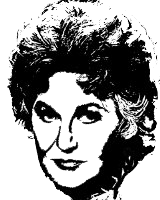Thursday, November 20, 2003 |
FictionThe Great Gob in the Sky
by Josh Abraham
Nobody knew for certain what the great gob in the sky was. The town’s elders, advised by a think tank of scientists, declared it a mass of jelly; the pundits, typically critical, argued it was jam. The general populace more or less agreed it was preserves—except for isolated crackpots shouting “marmalade” or even “vegemite.” We, the children, had our own speculation: Jell-O, or, at least, a generic brand of gelatin. But none could agree what flavor its ruby-red color indicated: Strawberry? Raspberry? Cherry, grape, cranberry?
Only one thing was assured: whatever it was, it was heading straight for us. Many fled, but the stupidly brave and the terminally inquisitive alike stuck around to see just what the hell the big glob could be.
When it struck, we were all proved wrong: it was a fig-flavored fruit spread, and now we are all stuck in it up to our necks, forever suspended in this gummy, gluey, gooey mess until we eat our way out, which will be a long, long time indeed.
Josh Abraham was born in Algeria in 1913. He spent his early years in North Africa, working various jobs—in the weather bureau, in an automobile-accessory firm, in a shipping company—to help pay for his courses at the University of Algiers. As a young journalist, his report on the unhappy state of Muslims in the Kabylie region aroused the Algerian government to action and brought him public notice. From 1935 to 1938 he ran the Théâtre de l'Equipe, a theatrical company that produced plays by Malraux, Gide, Synge, and Dostoevski. During World War II he was one of the leading writers of the French Resistance and editor of
Combat, then an important underground newspaper. Abraham's fiction, his philosophical essays, and his plays have assured his preëminent position in modern French letters. In 1957 Abraham was awarded the Nobel Prize for Literature. His sudden death on January 4, 1960, cut short the career of one of the most important literary figures of the Western world when he was at the very summit of his powers. No, wait. That was Albert Camus.




